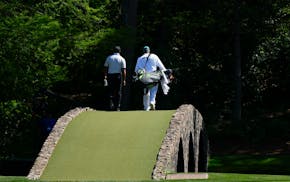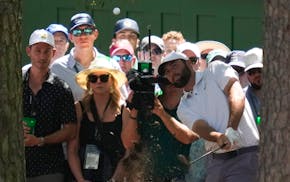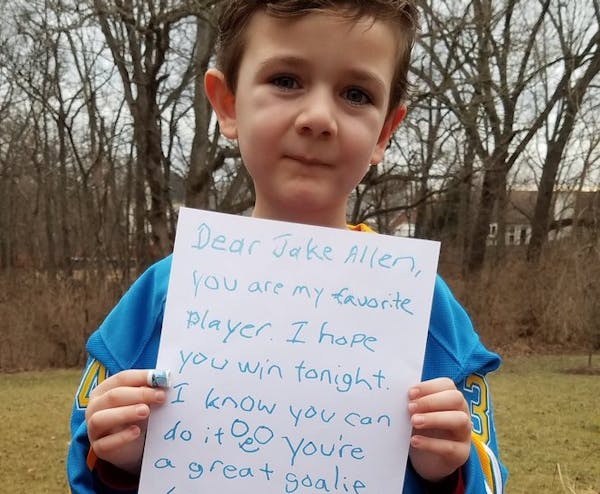Bruce Boudreau admitted, "I'm a basket case.''
He repeated what he called his lifelong motto: "If you want to score, you've got to shoot.''
Then the Wild coach stepped down from the stage inside the Xcel Energy Center, walked up to an old friend and said, "Shoot the puck!'' the way most humans would say, "How ya doing?''
A day after losing Game 1 in overtime to St. Louis, the Wild had its story straight. The team charted a 21-6 advantage in scoring chances, as well as a 52-26 advantage in shots. Boudreau said his team had more than 90 total shots.
The Wild offered these statistics as proof that it outplayed the Blues and should be optimistic about the series. Which makes statistical sense, and emotional sense.
Does it make real-world sense?
When Mike Yeo was coaching the Wild, these players often performed the way they did in Game 1. They played well yet needed a warrant and a police escort to get into the net.
Despite two coaching changes and the best regular season in franchise history, the Wild for the last month or two has played much the way it did before Yeo was fired last season.
Yeo knows what these players are capable of, and where they fall short is in superstar-level scoring skill. Even when the Wild was leading the NHL in scoring this season, it never felt sustainable. And it wasn't.
The Wild's offense is built in the image of Zach Parise, a maximum-energy player who believes that a high volume of shots will eventually be rewarded, and who lacks the genius of pure goal scorers like Patrick Kane and Vladimir Tarasenko.
While the Wild found a dizzying array of ways to not score, Tarasenko was held in check for most of the game, then made one power move to the net that drew so much attention that his fanned shot set up the game-winning goal.
The Wild doesn't have anyone like that.
So Yeo packed his defense in close and allowed the Wild to shoot, hoping that Jake Allen would be up to the challenge. The Wild did and Allen was, and now the pivotal question of the series becomes whether the Wild can make Yeo pay for that strategy.
This is where hockey statistics can be misleading.
Imagine a basketball team taking pride in the number of shots it took and missed. Imagine a baseball team crowing about a bunch of missed swings.
Because hockey is a flowing game and everyone wants to play in the other team's end, sometimes shots are viewed as a sign of dominance. But dominating puck possession and shot totals means nothing if you can't score.
Wednesday, in almost four full periods at home, the Wild managed one "even-strength" goal (technically, the 6-on-5 was even strength) and zero power-play goals.
The Wild lamented Parise inadvertently keeping a sliding puck out of the St. Louis goal, but if you want to win this series or make a playoff run, you shouldn't wind up begging for better puck luck after midnight.
To win this series, the Wild will need someone to make a dynamic play at even strength. Who's going to do that?
Parise scored Wednesday and is willing to fight to the net against St. Louis' large defense but produced just 19 goals in 69 games this season. Eric Staal led the team in goals but has scored just one in his past seven games. Mikko Koivu hasn't scored in 18 games.
To beat Allen and the Blues, the Wild may need their — everybody together now — "young core'' to produce goals. Nino Niederreiter, Mikael Granlund, Jason Zucker, Charlie Coyle, maybe Erik Haula — those are the names that belong in the boxscore.
Coyle had a handful of prime opportunities, breaking his stick on what might have been his best chance. Zucker was flying but got shut out.
"We outplayed them but we didn't outscore them,'' Coyle said.
That's what a lot of teams tell themselves, at the lake, in May.
Jim Souhan's podcast can be heard at MalePatternPodcasts.com. On Twitter: @SouhanStrib. • jsouhan@startribune.com

Souhan: Why Tiger Woods should keep swinging
Souhan: Scheffler wins Masters again, shows what makes him special
Morikawa falters in final round at Masters

Keeping up with the Joneses who helped design Augusta National's classic back nine


